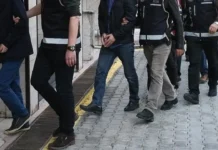The 3rd Criminal Chamber of Turkey’s Supreme Court of Appeals has upheld the convictions of eight former executives of Boydak Holding and the confiscation of their company shares over their alleged links to the Gülen movement, Turkish media reported.
The appeals court announced its decision on Tuesday for the appeal against the rulings of the 2nd Kayseri High Criminal Court issued on July 12, 2018.
According to the lower court’s decision, former Boydak Holding Chairman Memduh Boydak was sentenced to 18 years in prison for “leading an armed terrorist organization.”
The former managers of the holding — Mustafa, Bekir, Erol and İlyas Boydak and Murat Bozdağ — were sentenced to seven years, six months in prison each for “membership in an armed terrorist organization.”
The appellate court also ruled to uphold the prison sentences of almost 12 years for the holding company’s former CEO, Hacı Boydak and 10 years for the holding company’s former manager, Şükrü Boydak, on similar charges.
The Supreme Court of Appeals decision stated that the proceedings against the defendants were conducted in accordance with the law; the evidence on which the verdict was based was collected in accordance with the law; and that the defendants’ actions were correct as described.
The appeals court also approved a decision to confiscate the defendants’ shares in 35 companies transferred to the Savings Deposit Insurance Fund (TMSF).
In August 2016 the Turkish government had appointed trustees to the holding for its alleged ties to the Gülen movement.
The former Boydak Holding executives were detained in March 2016 on charges of links to the Gülen movement.
Boydak Holding, one of the largest conglomerates in Turkey, was active in a number of sectors, including energy, furniture and banking, with 38 subsidiaries. The holding had an annual turnover of more than TL 6 billion ($2 billion) and employed over 13,000 people before it was confiscated.
Turkish President Recep Tayyip Erdoğan has been targeting followers of the Gülen movement, a faith-based group inspired by Turkish cleric Fethullah Gülen, since the corruption investigations of December 17-25, 2013, which implicated then-prime minister Erdoğan, his family members and his inner circle.
Dismissing the investigations as a Gülenist coup and conspiracy against his government, Erdoğan designated the movement as a terrorist organization and began to target its members. He intensified the crackdown on the movement following a coup attempt on July 15, 2016 that he accused Gülen of masterminding.
Following the coup attempt, the Justice and Development Party (AKP) government launched a massive purge targeting real and alleged members of the movement under the pretext of an anti-coup fight, removing over 130,000 people from civil service jobs.
The AKP also seized schools, universities, media outlets, companies and their buildings and the assets of individuals, corporations and organizations that were believed to have had ties to the movement.
More than 1,100 companies have been transferred to Turkey’s TMSF, most of them following the failed coup. Journalists from confiscated newspapers and TV stations have been arrested, replaced and jailed.















